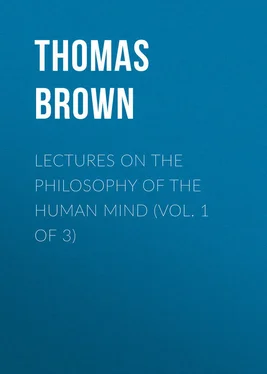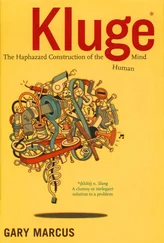Thomas Brown - Lectures on the Philosophy of the Human Mind (Vol. 1 of 3)
Здесь есть возможность читать онлайн «Thomas Brown - Lectures on the Philosophy of the Human Mind (Vol. 1 of 3)» — ознакомительный отрывок электронной книги совершенно бесплатно, а после прочтения отрывка купить полную версию. В некоторых случаях можно слушать аудио, скачать через торрент в формате fb2 и присутствует краткое содержание. Жанр: foreign_antique, foreign_prose, на английском языке. Описание произведения, (предисловие) а так же отзывы посетителей доступны на портале библиотеки ЛибКат.
- Название:Lectures on the Philosophy of the Human Mind (Vol. 1 of 3)
- Автор:
- Жанр:
- Год:неизвестен
- ISBN:нет данных
- Рейтинг книги:5 / 5. Голосов: 1
-
Избранное:Добавить в избранное
- Отзывы:
-
Ваша оценка:
- 100
- 1
- 2
- 3
- 4
- 5
Lectures on the Philosophy of the Human Mind (Vol. 1 of 3): краткое содержание, описание и аннотация
Предлагаем к чтению аннотацию, описание, краткое содержание или предисловие (зависит от того, что написал сам автор книги «Lectures on the Philosophy of the Human Mind (Vol. 1 of 3)»). Если вы не нашли необходимую информацию о книге — напишите в комментариях, мы постараемся отыскать её.
Lectures on the Philosophy of the Human Mind (Vol. 1 of 3) — читать онлайн ознакомительный отрывок
Ниже представлен текст книги, разбитый по страницам. Система сохранения места последней прочитанной страницы, позволяет с удобством читать онлайн бесплатно книгу «Lectures on the Philosophy of the Human Mind (Vol. 1 of 3)», без необходимости каждый раз заново искать на чём Вы остановились. Поставьте закладку, и сможете в любой момент перейти на страницу, на которой закончили чтение.
Интервал:
Закладка:
But even with regard to the mechanical affections of matter themselves, though all the changes which take place in nature were truly reducible to them, we should still have ultimately the same difficulty in attempting to predict, without experience, the changes that would ensue from them. The mechanical properties are indeed the most familiar to our thought, because they are those which we are constantly witnessing in the great displays of human power that are most striking to our senses. The house, the bridge, the carriage, the vessel, every implement which we use, and the whole wide surface of the cultivated earth, present to us, as it were, one universal trophy of the victories of the great mechanist, man. We cannot look back to the time when we were ignorant of the mechanical properties of matter; but still there was a time when they first became known to us, and became known by experience of the motions that resulted from them. What can be simpler than the phenomena of impulse? That a ball in motion, when it meets another at rest, should force this to quit its place, appears now to be something which it required no skill or experience to predict; and yet, though our faculties were, in every respect, as vigorous as now, – if we could imagine this most common of all phenomena to be wholly unknown to us, – what reason should we be able to discover in the circumstances that immediately precede the shock, for inferring the effect that truly results, rather than any other effect whatever? Were the laws of motion previously unknown, it would be in itself as presumable, that the moving ball should simply stop when it reached the other, or that it should merely rebound from it, as that the quiescent ball should be forced by it to quit its state of rest, and move forward in the same direction. We know, indeed, that the effect is different, but it is because we have witnessed it that we know it; not because the laws of motion, or any of the mechanical affections of matter whatever are qualities that might be inferred independently of observation.
Experience, then, is necessary in every case, for discovering the mutual tendencies of the elements of bodies, as much as for determining the reciprocal affections of the masses . But experience teaches us the past only, not the future, and the object of physical inquiry is, not the mere solitary fact of a change which has taken place, but the similar changes which will continually take place as often as the objects are again in the same circumstances, – not the phenomena only, but the powers by which the phenomena are produced.
Why is it, then, we believe that continual similarity of the future to the past, which constitutes, or at least is implied, in our notion of power? A stone tends to the earth, – a stone will always tend to the earth, – are not the same proposition; nor can the first be said to involve the second . It is not to experience, then, alone that we must have recourse for the origin of the belief, but to some other principle, which converts the simple facts of experience into a general expectation, or confidence, that is afterwards to be physically the guide of all our plans and actions.
This principle, since it cannot be derived from experience itself, which relates only to the past, must be an original principle of our nature. There is a tendency in the very constitution of the mind from which the expectation arises, – a tendency that, in every thing which it adds to the mere facts of experience, may truly be termed instinctive ; for though that term is commonly supposed to imply something peculiarly mysterious, there is no more real mystery in it than in any of the simplest successions of thought, which are all, in like manner, the results of natural tendency of the mind to exist in certain states, after existing in certain other states. The belief is, a state or feeling of the mind as easily conceivable as any other state of it, – a new feeling, arising in certain circumstances as uniformly as in certain other circumstances. There arise other states or feelings of the mind, which we never consider as mysterious; those, for example, which we term the sensations of sweetness or of sound. To have our nerves of taste or hearing affected in a certain manner, is not, indeed, to taste or to hear, but it is immediately afterwards to have those particular sensations; and this merely because the mind was originally so constituted, as to exist directly in the one state after existing in the other. To observe, in like manner, a series of antecedents and consequents, is not, in the very feeling of the moment, to believe in the future similarity, but, in consequence of a similar original tendency, it is immediately afterwards to believe, that the same antecedents will invariably be followed by the same consequents . That this belief of the future is a state of mind very different from the mere perception or memory of the past, from which it flows, is indeed true; but what resemblance has sweetness, as a sensation of the mind, to the solution of a few particles of sugar on the tongue, – or the harmonies of music, to the vibration of particles of air? All which we know, in both cases, is, that these successions regularly take place; and in the regular successions of nature, which could not, in one instance more than in another, have been predicted without experience, nothing is mysterious, or every thing is mysterious. It is wonderful, indeed, – for what is not wonderful? – that any belief should arise as to a future which as yet has no existence; and which, therefore, cannot, in the strict sense of the word, be an object of our knowledge. But, when we consider Who it was who formed us, it would, in truth, have been more wonderful, if the mind had been so differently constituted that the belief had not arisen; because, in that case, the phenomena of nature, however regularly arranged, would have been arranged in vain, and that Almighty Being, who, by enabling us to foresee the physical events that are to arise, has enabled us to provide for them, would have left the creatures, for whom he has been so bounteously provident, to perish, ignorant and irresolute, amid elements that seemed waiting to obey them, – and victims of confusion, in the very midst of all the harmonies of the universe.
Mr Hume, indeed, has attempted to show, that the belief of the similarity of future sequences of events is reducible to the influence of custom, without the necessity of any intuitive expectation; but he has completely failed in the reasoning with which he has endeavoured to support this opinion. Custom may account for the mere suggestion of one object by another, as a part of a train of images, but not for that belief of future realities, which is a very different state of mind, and which, perhaps, does not follow every such suggestion, however frequent and habitual. The phenomenon A, a stone has a thousand times fallen to the earth; the phenomenon B, a stone will always, in the same circumstances, fall to the earth; are propositions that differ as much as the propositions, A, a stone has once fallen to the earth; B, a stone will always fall to the earth. At whatever link of the chain we begin, we must still meet with the same difficulty – the conversion of the past into the future. If it be absurd to make this conversion at one stage of inquiry, it is just as absurd to make it at any other stage; and, as far as our memory extends, there never was a time at which we did not make the instant conversion, – no period, however early, at which we were capable of knowing that a stone had fallen, and yet believed that, in exactly the same circumstances, there was no reason to suppose that it would fall again. But on this particular error of Mr Hume, the very narrow outline, within which the present sketch is necessarily bounded, will not permit me to enlarge. I have examined it, at considerable length, in the third edition of the Inquiry which I have published on the Relation of Cause and Effect.
Читать дальшеИнтервал:
Закладка:
Похожие книги на «Lectures on the Philosophy of the Human Mind (Vol. 1 of 3)»
Представляем Вашему вниманию похожие книги на «Lectures on the Philosophy of the Human Mind (Vol. 1 of 3)» списком для выбора. Мы отобрали схожую по названию и смыслу литературу в надежде предоставить читателям больше вариантов отыскать новые, интересные, ещё непрочитанные произведения.
Обсуждение, отзывы о книге «Lectures on the Philosophy of the Human Mind (Vol. 1 of 3)» и просто собственные мнения читателей. Оставьте ваши комментарии, напишите, что Вы думаете о произведении, его смысле или главных героях. Укажите что конкретно понравилось, а что нет, и почему Вы так считаете.












![Anne Blunt - A Pilgrimage to Nejd, the Cradle of the Arab Race. Vol. 1 [of 2]](/books/749489/anne-blunt-a-pilgrimage-to-nejd-the-cradle-of-the-thumb.webp)